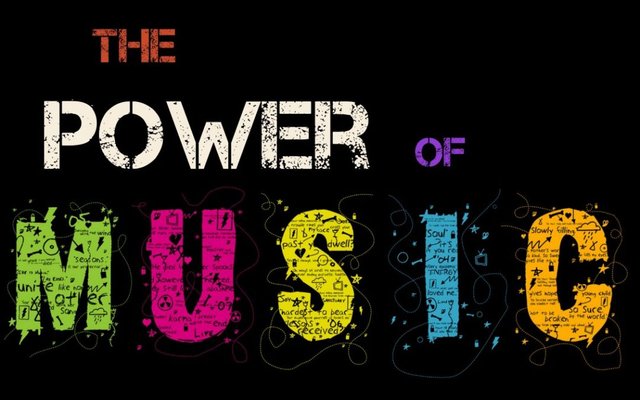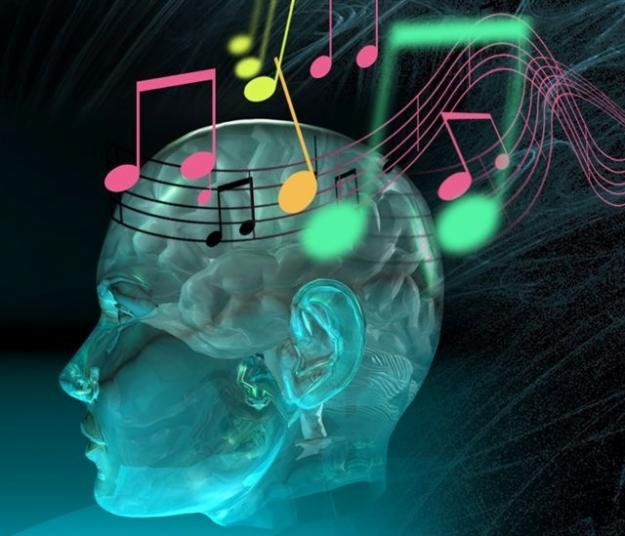The power of music
We've always known that life is better with music, and now neurologists explain why.

source picture
As soon as we hear the first notes of a piece of music we like, our brain responds by releasing dopamine: the same neurotransmitter that makes us feel pleasure when we eat something delicious or fall in love.
In addition to making the brain happy, music has the power to modify it, increasing the connections between neurons. Children with some form of musical training (for example, learning to play an instrument) develop more math skills and greater readability. They also improve their self-esteem and become more social.
Studies show that music helps us to prevent disease, because sick people recover faster. How about that, huh?
A song acts on the brain like it's a drug. But that's not all: the heart rate synchronizes with that of a melody and our feet help to regulate blood circulation in the legs.
The songs act like drugs
Using magnetic resonance imaging, experts at U. McGill (Canada) obtained an accurate portrait of the melodies in the brain. One of the first findings of the research - published in January and involving 217 people - is that music activates the release of the reward-linked chemical dopamine in the areas known as dorsal and ventral striatum, associated with our response to pleasurable stimuli. But that's not all: the increase varies, on average, between 6% and 9%, a phenomenon that begins 15 seconds before the climax of a song.
Previous analyses have shown that cocaine raises dopamine levels by 22%, while a pleasant meal does so by 6%. "In the music test, one person experienced a 21% increase, which shows that for some people a song can be extremely pleasant," neuroscientist Valorie Salimpoor told The Guardian. The expert added that "dopamine is key, because it makes us repeat behaviors. It is the reason why addictions exist, positive or negative. The euphoria of music is reinforced neurochemically, so we always return to it.Shaking his head to the sound of rock
Daniel Levitin, a psychologist and neuroscientist at McGill, is one of the leading authorities on the processes that unleash music in the brain, as well as being a music producer for Stevie Wonder. In his book Este es su cerebro con la música (This is his brain with music), he includes several studies on the subject. In one of his first experiments, Levitin stopped several strangers in the street and asked them to sing a favorite song by heart.
When comparing the results with a record, he noted that most replicated the rhythm with a margin of error of only 4%, and 66% sang with a tone very similar to the original. If most memories become distorted over time, why does the music remain? In magnetic resonance studies, Levitin identified a complex circuit: music first activates the front end of the brain, which is responsible for processing sensory information and, more importantly, decoding language, revealing its complexity. Then, dopamine is released and the cerebellum, an area associated with physical movement, is triggered, which explains why we feel the need to move our hips to the sound of the sauce or shake our heads with a heavy metal theme.
- The musical ear can be shaped
The differences in our ability to appreciate music are due, according to scientists, to structural differences in the brain and exposure to a melodic environment. During the 1990s, German neurologists compared MRIs of 27 skilled pianists with those of 27 skilled non-musicians.
They discovered that the part of the brain associated with auditory processing was greater in the left hemisphere of musicians, particularly those who were heavily exposed to music before age seven. It was even determined that the corpus callosum, an area made up of millions of nerve fibers that connect the two hemispheres, is 10% to 15% thicker than in those who are not musicians or who began to practice later.
In fact, Levitin explains that several studies show that if a child is not exposed to music during the first 10 years of life, he or she may never develop a taste for the art. Not everyone who listens to music or learns to play it from an early age becomes Mozart, but they do develop a particular acuity to identify rhythms, arrangements and scores, he adds.
- Our heart follows the melody
Music not only affects our brain, it modulates blood pressure, heart rate and breathing. A team led by Dr. Luciano Bernardi, from the University of Pavia (Italy), analyzed 24 volunteers, half of whom were semi-professional singers and the rest were people without musical training. Listening to five selections by authors such as Beethoven, Bach and Puccini, followed by two-minute segments of silence, the experts discovered how the crescendos of each track generated a proportional contraction of blood vessels and increases in blood pressure and heart rate, as well as more intense breathing.
The analysis also showed that during the quieter stretches, these measures declined. But more importantly, the richer sections of each track, such as those in Verdi's arias and each of which lasts about 10 seconds, make the heartbeat synchronize with the music. This was a rapport that took place in both groups of volunteers, although the musicians showed a more intense response.
- Feet set the pace and circulation
Several researchers argue that keeping pace with the feet while listening to a radio track actually operates as an automatic mechanism to slow the increase in blood circulation that occurs in our legs, generated especially by the activation of the motor zones of the brain.
Greg McLatchie, a surgeon and sports specialist at the U. Sunderland in England, told The Guardian that the practice of keeping up the pace is particularly good for improving circulation: "Some people move their feet up to 10 hours a day, either because their head is full of a song or they just do it while watching TV, working or eating. We may not consider it a physical activity, but it is a physical activity and, in addition to improving circulation, it helps us keep our weight off. According to a report from the Mayo Clinic, moving your feet steadily for eight hours is equivalent to a 30-minute squash session, in terms of burning calories. "This movement uses the largest muscle in the calf, which needs energy from carbohydrates, so activating it burns calories," McLatchie adds.
- A pianist doesn't compare to an mp3 player.
Why do live performances move us more than listening to an mp3 player on an iPod, why do musicians spend years perfecting their art until they are able to shed a tear or a smile? Scientists from the U. Florida Atlantic (USA) identified key aspects of a live presentation that activate brain areas linked to emotions, as well as showing, for the first time, how these small details captivate the brain in real time.
The experts recorded an interpretation of Chopin's work, by a professional pianist, and then produced a digital version of the same piece on a computer. Analyzing the reaction of music aficionados to music, using magnetic resonance imaging, it was determined that the piece interpreted by a human - which included dynamic changes in rhythm and intensity - generated more activity in the brain areas linked to emotions and reward. More importantly, the slight variations generated changes in real-time neural activity, especially in the motor areas responsible for keeping up with the rhythm and in the brain system known as the mirror neuron, which is activated when people watch someone else perform an action they can do themselves.

Sneaky Ninja Attack! You have just been defended with a 5.24% upvote!
I was summoned by @reesteemiter. I have done their bidding and now I will vanish...
woosh
A portion of the proceeds from your bid was used in support of youarehope and tarc.
Abuse Policy
Rules
How to use Sneaky Ninja
How it works
Victim of grumpycat?
Music actually has a great power, and for me, listening to music is an amazing way for me to distract from problems and just relax. But I can tell you that I'm a huge fan of live versions of songs, I prefer listening to live performances than studio recordings. And with Tubidy, there are no difficulties for me to download the songs I like from Youtube, the music database there is the greatest, no doubt.